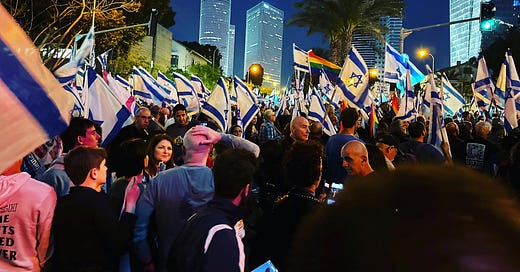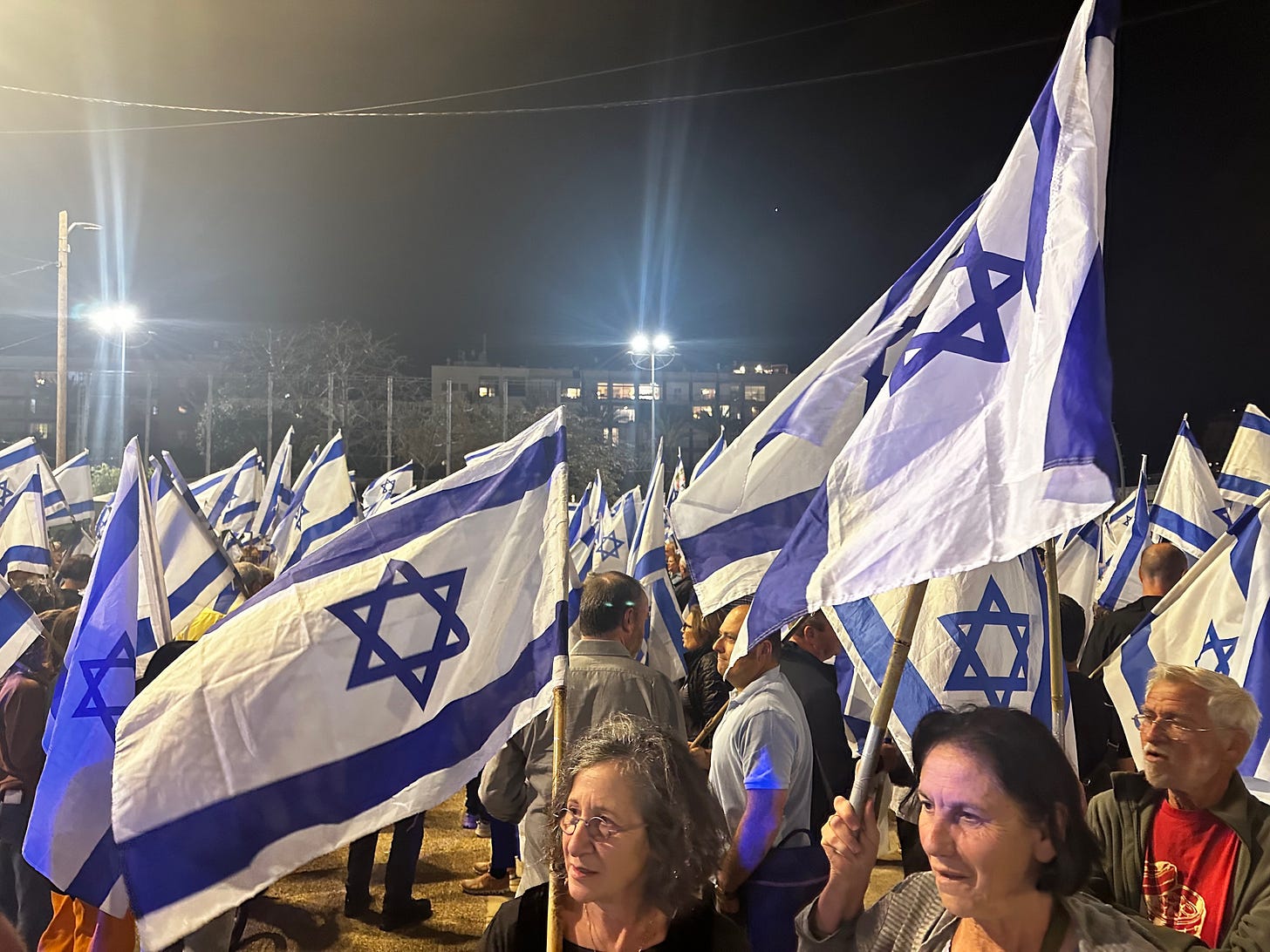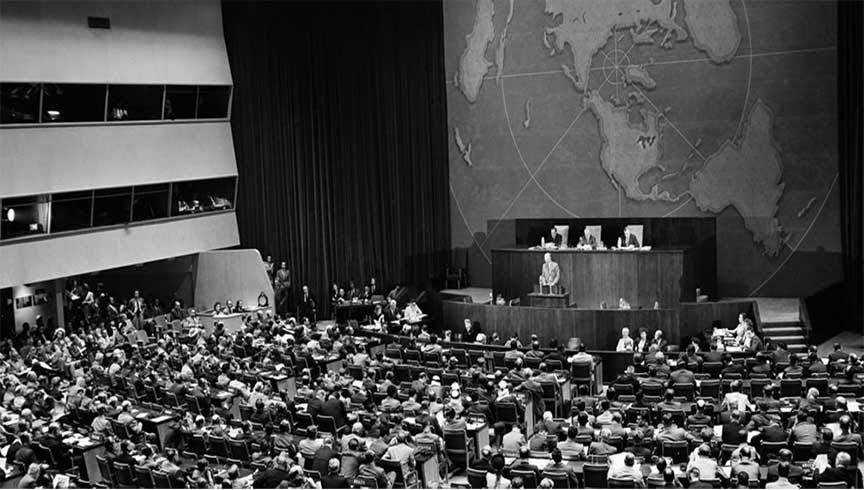Tel Aviv Diary April 21
Threats of War, Ultra Orthodox Draft,Protest Continue as Israel Prepares to Celebrate Memorial and Independence Days
DEFENSE
Compared to recent previous weeks, this past week has been relatively quiet. A terror attack occurred in Jerusalem on Tuesday morning, which left two people wounded. The perpetrator, a 15-year-old, was arrested. There was also an attempted stabbing near Gush Etzion, as well as several shootings in the West Bank that did not result in any injuries.
It was also reported that Israel attacked Iranian targets in Syria, once again.
Minister of Defense Gallant warned that Israel faces growing threats, saying: “We operated for years under the assumption that limited conflicts could be managed, but that is a phenomenon that is disappearing. Today, there is a noticeable phenomenon of the convergence of the arenas.”
DIPLOMACY & FOREIGN AFFAIRS
Foreign Minister Eli Cohen is in Turkmenistan, officially opening the Israeli Embassy there. Israel has developed strong ties with the former Soviet Republic
.
Meanwhile, the warming of diplomatic relations within the Arab world has continued. However, after Iran and Saudi Arabia agreed to resume relations, the Saudi Foreign Minister visited Damascus. All of this does not bode well for Israel and its hopes to establish diplomatic relations with Saudi Arabia.
MINISTRY OF HEALTH
This week, MK Moshe Arbel became the Minister of Health and Minister of Interior, replacing Aryeh Deri, who was barred from serving as a minister. Arbel, 40 years old, is a rabbi and holds a law degree from Kiryat Ono Law School. He has been a member of the Knesset, representing Shas since 2019. How this qualifies him to simultaneously manage two important ministries is unclear.
Ultra-Orthodox Draft
When the Knesset returns from its holiday break, its first order of business will be to pass the government budget. If the new budget is not passed, the government will fall, and a new election would have to be held. In light of polls, both this and last week, which show if elections were held today, the current coalition would be out of power, coalition members will do all they can to pass the budget. The primary obstacle to passing the budget is the ultra-Orthodox parties’ demand to address the issue of drafting ultra-Orthodox youth into the IDF.
Currently, students must remain in Yeshiva until the age of 26 in order to become exempt from army service. The ultra-Orthodox parties want to reduce the exemption age to 23, while the Ministry of Finance, led by Smotritch, (who himself completed only a brief army service, since he attended a Yeshiva), would like to lower the age to 21. Unfortunately, almost any change is challenging to justify.
Economically, it makes sense to exempt the ultra-Orthodox from military service at the earliest possible age, since most are likely not to serve in the army anyway. Providing an earlier exemption would enable ultra-Orthodox young people to pursue secular education, or learn a trade that would provide a living wage before getting married and having children.
However, while the government debates granting such an exception, less than one week away from Yom HaZikaron, it is impossible not to consider the graveyards filled with young men, mostly secular, but including non-ultra Orthodox religious community members, who gave their lives defending this country. How can a whole subset of the population which is growing rapidly be exempted from the ultimate burden? In this time of fierce national division brought on by the proposed Judicial overhaul, lowering the exemption age will further fuel protests.
One of the main reasons the ultra-Orthodox parties want the judicial overhaul is to prevent the Supreme Court from blocking legislation that would disproportionately benefit their communities at the expense of everyone else. With the coalition’s proposed Judicial overhaul currently stalled, it is unclear what plan could pass legal muster.
There are some calls for an end to universal draft in favor of a well-paid professional army. However, that arrangement would be disastrous on several fronts, including social integration, common experience, and a shared sense of responsibility. The critical factor is that universal draft (excluding ultra-Orthodox and Arab Israelis) allows Israel to assign the most exceptional youth to become pilots, commandos, and cyber warriors. Israel excels in numerous strategic fields because everyone in the country is tested and interviewed, as a result, the best candidates are identified. If Israel eliminates its universal draft, the best candidates may choose to attend Hebrew University or Stanford University, instead of becoming pilots or cyber experts in the IDF.
Protests and Judicial Reform
The protests continue, despite ongoing talks at the President's residence aimed at reaching some consensus. It is truly impossible to know where things really stand. Some believe Prime Minister Netanyahu has decided that the price of proceeding with the proposed Judicial “reform” without broad consensus is too high, and is therefore trying to find a way to shelve the plan, without appearing weak. Meanwhile, some more outspoken government members claim that as soon as the Knesset reconvenes, they will move to pass the legislation. The protest movement remains vigilant, and it is not possible to predict what will happen in the coming two months.
On Tuesday, which was Yom HaShoah, an El Al pilot on a flight from New York announced over the plane’s loudspeaker that the Holocaust could only occur in a dictatorship and that this is why he is fighting the current government. Right-wing politicians immediately attacked him, and the CEO of El Al sent out a letter apologizing for the pilot’s behavior, stressing that that was not the El Al way. The pilot has been asked to explain himself to the company, but other pilots are supporting him, and have warned that if any action beyond a reprimand is taken against the pilot, all of El Al's pilots will suddenly come down with the flu.
Pro-COALITION DEMONSTRATION
In the meantime, the right-wing is planning a “huge demonstration” in support of the proposed Judicial changes. They have held demonstrations at the home of Aharon Barak, the octogenarian former Chief Justice of the Supreme Court who retired 16 years ago, where Barak lives with his ailing wife. At the demonstrations, they verbally assaulted Barak, mockingly shouting, “It's too bad you were not killed by the Nazis.” On TV, a Likud mouthpiece called for supporters to make Barak’s life (referring to the 86-year-old Holocaust survivor) hell. At the same time, a Likud Knesset member called on Barak to resign. The absurdity of calling on someone who retired 16 years ago to resign is beyond comprehension. On Thursday night, thousands of people gathered in Rabin Square in support of Barak, and then walked to his home nearby. Barak, his children and his wheelchair bound wife came down to greet the demonstrators who were shouting “Todah,” Thank you to the esteemed elder jurist
.
FROM SHOAH TO INDEPENDENCE
This week's update comes during the time described as the period of national commemoration and celebration. We marked Holocaust Remembrance Day (Yom HaShoah) this past week, and next week, we will observe National Memorial Day for those who fell in combat, as well as those who perished in terror attacks. The numbers of soldiers killed has increased by 59 over the course of the past year, while an additional 86 disabled veterans died prematurely due to complications related to their injuries. This brings the sum to 24,213 soldiers who have made the ultimate sacrifice to defend this nation.
While our shared tragedies and celebrations typically unite us, this year's independence celebration, which would normally be distinctly celebratory, (as it marks our 75th year of independence), will take place in the shadow of the proposed judicial reform, which has divided the country like nothing has in a generation.
AND THE DEMONSTRATIONS CONTINUE …
During the past three months, I have attended more demonstrations than I did in all my youth (and I attended countless demonstrations on behalf of Soviet Jewry and in support of Israel). Protesting against the Israeli government has been a very unusual experience. The first week of demonstrations primarily brought out the traditional demonstrators, i.e., older Meretz voters. By the second week, as the crowds grew, the mix of the crowd changed, and suddenly there were noticeably more young people. The generation that had always been considered apolitical is suddenly turning out in the tens of thousands— many of them high-tech workers, along with many of their bosses, who are the ones funding the protest movement.
From the outside, it looks like one of the best-funded and best-organized protest movements ever. However, what separates these demonstrations from any I have known in the past is that they have been about an idea: the idea of Democracy. The chants and often clever signage are about democracy and, more importantly, the meaning of democracy. There are even chants on the meaning of the separation of powers. The demonstrations are now about much more than judicial reform; they are about the type of state we want — which is a liberal democracy, and not something that resembles a theocracy.
A generation of Israelis has woken up to the fact that two societal sectors have been getting steadily stronger — i.e., the ultra-Orthodox and the ultra-Nationalists. Both groups share ideas and sometimes lifestyles that are an anathema to most liberal Israelis, and both groups have slowly been imposing their views on the public, thanks to Israel's problematic electoral system. Now, what was once Israel's “silent majority” has awakened and made it clear they are not willing to fund and fight for the aspirations of these two groups.
INCREASED PUBLIC FUNDS TO WEST BANK
In related news, the Ministry of Transportation has unveiled its budget. A staggering 25% of the budget will go towards construction of roads in the West Bank. This allocation is significantly disproportionate to the percentage of the population that resides there.
MAY THEIR MEMORIES BE A BLESSING
During the past two weeks, Israel mourned the loss of two cultural giants. First, the renowned author and columnist Meir Shalev (age 74) passed away a week ago. Yehonatan Geffen (age 76) passed away this week. Both Shalev and Geffen were both born in Nahalal, Israel's first moshav located in the Jezreel Valley, and within a week of each other, both were laid to rest there.
Meir Shalev was a celebrated author whose works were translated into numerous languages, resonating with readers around the world. He was also a respected columnist, often sharing his insights and opinions on various topics in Israeli society. His passing leaves a void in the world of literature and journalism.
Yehonatan Geffen was a legendary songwriter and poet, penning some of the most iconic and beloved songs in Israeli music history. His lyrics touched the hearts of many, transcending generations and becoming an integral part of the nation's cultural fabric.
Both Shalev and Geffen were products of Nahalal, a testament to the creative spirit and sense of community fostered within the moshav. Their contributions to Israeli culture will be remembered and cherished for years to come, and their passing marks the end of an era.
BUSINESS
Business Coro has received $75 million in funding for its AI-based cybersecurity platform. The investment comes from Energy impact Investments and values the company at $575 million.
Insurtech Capitola received an investment of $16 million. The company uses AI to improve communications between insurance companies and insurance agents
.
Cyfirma raised a Pre-Series B funding round with $18 million investment from OurCrowd and Indian multinational conglomerate Larsen & Toubro's L&T Innovation Fund. The company’s groundbreaking, cloud-native SaaS cybersecurity platform provides clients with predictive, personalized, contextual and multi-layered threat insights on a single screen.
Elbit Systems Ltd. announced it was awarded a contract worth approximately $102 million to supply artillery systems to an international customer. The contract will be performed over a period of eight years. Under the contract Elbit Systems will supply a battalion's worth of ATMOS (Autonomous Truck Mounted Howitzer) 155mm/52 caliber truck-mounted howitzers systems.
In addition, Elbit received a contract for a different international customer to convert a commercial aircraft into an Electronic Warfare aircraft. The contract is worth $100 million.
A PIECE OF HISTORY—United Nations Committee on Palestine
On February 18, 1947, British Foreign Minister Ernest Bevin announced in the House of Commons that the British government saw no prospect of a solution to the problems in Palestine. On April 2, the British delegation to the United Nations requested that the UN Secretary-General convene a special session of the UN General Assembly as soon as possible to determine the future of Palestine. The British decision to entrust the issue to the United Nations was reached for several reasons, and it should be understood within the context of a post-World War II British Empire in decline. Although Britain had emerged as one of the victors, the economic and human costs of the war were immense, and the British increasingly relied on the United States for economic support. Negative publicity arising from Britain's rejection of illegal immigrants made it harder to secure desperately needed financial aid. Additionally, the occupation of Palestine became increasingly burdensome, both economically and militarily. Having endured devastating casualties during World War II, the British public was unwilling to bear such hardships in this matter.
A special session of the United Nations commenced on April 27, 1947. The first item on the agenda concerned whether the Jewish Agency should be permitted to represent the Jewish people's case. Despite initial objections that there was no provision for non-governmental organizations to present before the UN, Jewish Agency representatives were allowed to address the United Nations' first committee. Abba Hillel Silver, Moshe Shertok, and David Ben-Gurion presented the case for the Jewish Agency. The primary agenda item was determining the composition of the special committee of inquiry. Following extensive debate, it was decided that the United Nations committee would consist of representatives from eleven small states, excluding the five major countries.
Throughout the summer of 1947, the United Nations committee conducted numerous hearings and meetings in Palestine to evaluate the situation there. Thirteen public meetings and 18 closed sessions took place in Palestine, with 34 witnesses called upon. From Palestine, the committee proceeded to Beirut, where it listened to the perspectives of the Arab governments. The final stop for the committee was Geneva, where subcommittees visited camps for displaced persons and reported that nearly all displaced individuals desired to relocate to Palestine. The committee produced two reports: a majority report and a minority report. The majority report, supported by representatives from Australia, Canada, Czechoslovakia, Guatemala, the Netherlands, Peru, Sweden, and Uruguay, advocated for the creation of two independent states in Palestine – one Jewish and one Arab. The minority plan, backed by India, Iran, and Yugoslavia, proposed the establishment of a confederation comprising two subordinate states – one Arab and one Jewish
.
A TASTE OF TEL AVIV — RADLER
RESTAURANT REVIEW, by Tali Schulman
Take a stroll down Nachalat Benyamin and eventually you will come across “Radler”, a delicious addition to the assortment of food and drink establishments on the street. Located inside of the Alberto Boutique Hotel, Radler offers a menu packed with fish, seafood, fresh veggies and meat, spearheaded by Chef Moshiko Gamlieli. You may have heard of Chef Moshiko from one of his other very popular and successful establishments “Bar 51” (also in Tel Aviv), and “Mona” (in Jerusalem). If you’ve been to, and enjoyed, one of his other hot-spots, I am confident you will enjoy Radler just as much. My favorite dish was the Delice De Bourgogne Focaccia with roasted Zucchini, there’s something about Zucchini on delicious bread that I always love, but each of the fish and seafood dishes were also perfectly executed. If you haven’t already had the chance to check it out, take this as your sign to make a reservation
!
For more Tel Aviv restaurant recommendations, you can find me on Instagram @talischulman where I save all my food adventures in my highlights!











Judicial reform will strengthen Israeli democracy.